高中英语45个介词的基本用法
- 格式:doc
- 大小:392.00 KB
- 文档页数:58
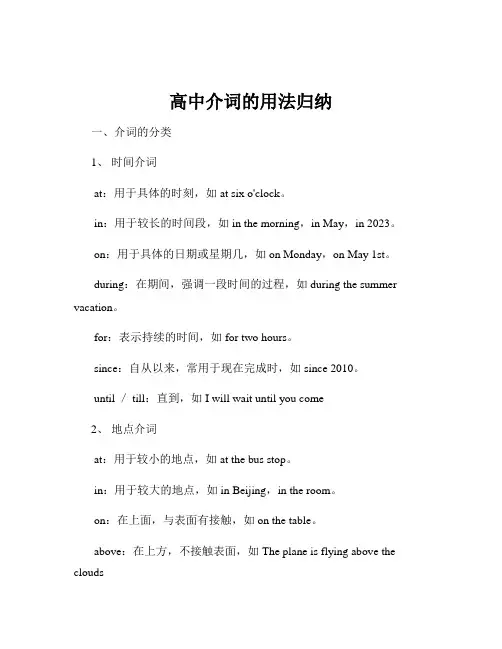
高中介词的用法归纳一、介词的分类1、时间介词at:用于具体的时刻,如 at six o'clock。
in:用于较长的时间段,如 in the morning,in May,in 2023。
on:用于具体的日期或星期几,如 on Monday,on May 1st。
during:在期间,强调一段时间的过程,如 during the summer vacation。
for:表示持续的时间,如 for two hours。
since:自从以来,常用于现在完成时,如 since 2010。
until / till:直到,如 I will wait until you come2、地点介词at:用于较小的地点,如 at the bus stop。
in:用于较大的地点,如 in Beijing,in the room。
on:在上面,与表面有接触,如 on the table。
above:在上方,不接触表面,如 The plane is flying above the cloudsover:在正上方,垂直上方,如 There is a bridge over the river under:在下面,如 The cat is under the chairbelow:在下方,不一定垂直,如 The temperature is below zero between:在之间(两者),如 between A and B。
among:在之间(三者或三者以上),如 among the students。
3、方式介词by:通过方式,如 by bike,by bus。
with:使用工具,如 with a pen,with my hands。
in:用语言,如 in English,in Chinese。
4、其他常见介词of:的,如 a map of China。
to:朝,向,如 go to school。
from:从,如 from Beijing to Shanghai。
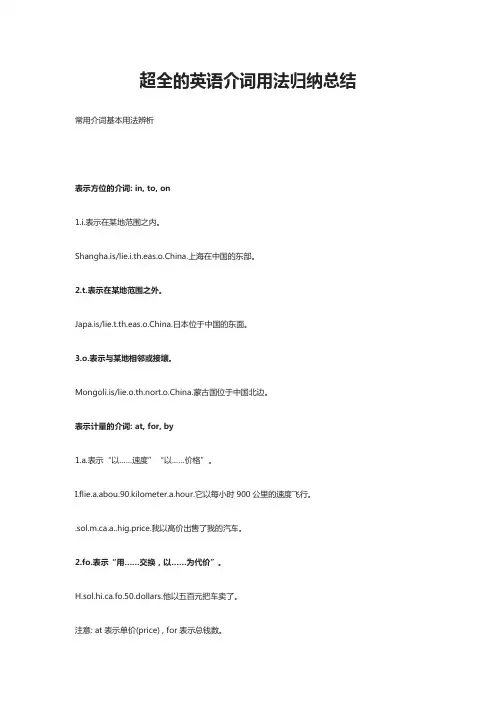
超全的英语介词用法归纳总结常用介词基本用法辨析表示方位的介词: in, to, on1.i.表示在某地范围之内。
Shangha.is/lie.i.th.eas.o.China.上海在中国的东部。
2.t.表示在某地范围之外。
Japa.is/lie.t.th.eas.o.China.日本位于中国的东面。
3.o.表示与某地相邻或接壤。
Mongoli.is/lie.o.th.nort.o.China.蒙古国位于中国北边。
表示计量的介词: at, for, by1.a.表示“以……速度”“以……价格”。
I.flie.a.abou.90.kilometer.a.hour.它以每小时900公里的速度飞行。
.sol.m.ca.a..hig.price.我以高价出售了我的汽车。
2.fo.表示“用……交换,以……为代价”。
H.sol.hi.ca.fo.50.dollars.他以五百元把车卖了。
注意: at表示单价(price) , for表示总钱数。
3.b.表示“以……计”, 后跟度量单位。
The.pai.hi.b.th.month.他们按月给他计酬。
Her.egg.ar.sol.b.weight.在这里鸡蛋是按重量卖的。
表示材料的介词: of, from, in1.o.成品仍可看出原料。
Thi.bo.i.mad.o.paper.这个盒子是纸做的。
2.fro.成品已看不出原料。
Win.i.mad.fro.grapes.葡萄酒是葡萄酿成的。
3.i.表示用某种材料或语言。
Pleas.fil.i.th.for.i.penci.first.请先用铅笔填写这个表格。
The.tal.i.English.他们用英语交谈。
表示工具或手段的介词: by, with, on1.b.用某种方式, 多用于交通。
.wen.ther.b.bus.我坐公共汽车去那儿。
2.with表示“用某种工具”。
H.brok.th.windo.wit..stone.他用石头把玻璃砸坏了。
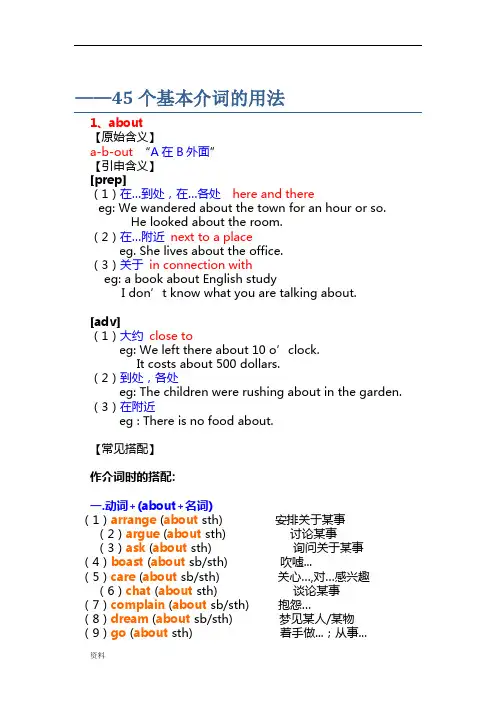
——45个基本介词的用法1、about【原始含义】a-b-out “A在B外面”【引申含义】[prep](1)在…到处,在…各处here and thereeg: We wandered about the town for an hour or so.He looked about the room.(2)在…附近next to a placeeg. She lives about the office.(3)关于in connection witheg: a book about English studyI don’t know what you are talking about. [adv](1)大约close toeg: We left there about 10 o’clock.It costs about 500 dollars.(2)到处,各处eg: The children were rushing about in the garden. (3)在附近eg : There is no food about.【常见搭配】作介词时的搭配:一.动词+(about+名词)(1)arrange (about sth) 安排关于某事(2)argue (about sth) 讨论某事(3)ask (about sth) 询问关于某事(4)boast (about sb/sth) 吹嘘...(5)care (about sb/sth)关心…,对…感兴趣(6)chat(about sth) 谈论某事(7)complain(about sb/sth) 抱怨…(8)dream (about sb/sth) 梦见某人/某物(9)go (about sth) 着手做...;从事...(10)hear (about sth) 听说...(11)know(about sth) 了解...(12)learn (about sth) 得知某事(13)put (about sth)散布(谣言等)(14)quarrel (about sth) 为...争吵(15)see (about sth) 负责处理...(16)talk(about sth) 谈论...(17)think (about sth) 考虑..(18)warn sb (about sth) 告诫某人关于某事(19)wonder(about sb/sth) 对.. 好奇(20)worry(about sb/sth) 对...担心二、名词+(about+名词)(1)concern (about sb/sth) 对…的关心/关怀(2)curiosity (about sb/sth) 对…的好奇(3)doubt (about sb/sth) 对…的怀疑(4)ethusiasm (about sth) 对…的热情(5)information (about sb/sth) 关于…的信息(6)remark (about sth) 对…的评论(7)opinion (about sth) 对…的意见(8)view (about sb/sth) 对...的观点三、be+adj+(about+名词)(1)be angry (about sth) 为…而生气(2)be anxious(about sth) 为…忧虑(3)be careful(about sth) 当心…(4)be cautious (about sth) 谨防...;对...持谨慎态度(5)be certain (about sth) 确信关于某事(6)be curious (about sth) 对…感到好奇(7)be disappointed (about sth) 对…感到失望(8)be excited (about sth) 对…感到兴奋(9)be glad/happy (about sth) 对…感到高兴(10)be hopeful (about sth) 对…抱有希望(11)be crazy/mad/wild (about sth)对…痴狂;酷爱某事(12)be nervous (about sth)为…感到不安/因...感到紧张(13)be optimistic/positive (about sth)对...是积极乐观的(14)be particular (about sb/sth) 对... 讲究,挑剔(15)be sad (about sth) 为…而难过(16)be serious (about sth) 对…认真(17)be sorry (about sth) 对...抱歉作副词时的搭配:名词+动词+about(1)sth come about某事发生(2)sth get about某事(尤指消息等)传开(3)sb turn about某人转身(4)sb wander about某人徘徊,游荡(5)sb walk about 某人走来走去2、above【原始含义】a-b-over“A在B上方”【引申含义】prep.(1)在…上方at or to a higher place than sth/sbeg: The sun rose above the horizon.(2)数目大于…/重量超过…/价格(能力、地位)高于…more than sth.; greater in number, level or age than sb./sth.eg: There is nothing in the store above 50 cents. (3)重要性或质量超过、胜过of greater importance or of higher quality than sb/sth eg. I rate her above most other players of her age. (4)声音超过…louder or clearer than another sound eg: I couldn’t hear her above the noise of the traffic. (5)不至于,不屑于做某事too good or too honest to do stheg. She is above suspicion.【常见搭配】一、动词+(above+名词)(1)live ( above one’s income) 入不敷出地生活(2)put A(above B) 把A看得比B更重要(3)rise (above sth) 克服...,不受....的影响(4)talk (above one’s head) 高深莫测地谈论二、be+(above+名词)(1)be (above oneself )兴高采烈= be in one’s high spirit(2)be (above one’s head)难以理解/超出某人理解能力3、across【原始含义】a-grass“一片草坪”,across指在平面上经过,就像人走过一片草坪那样。
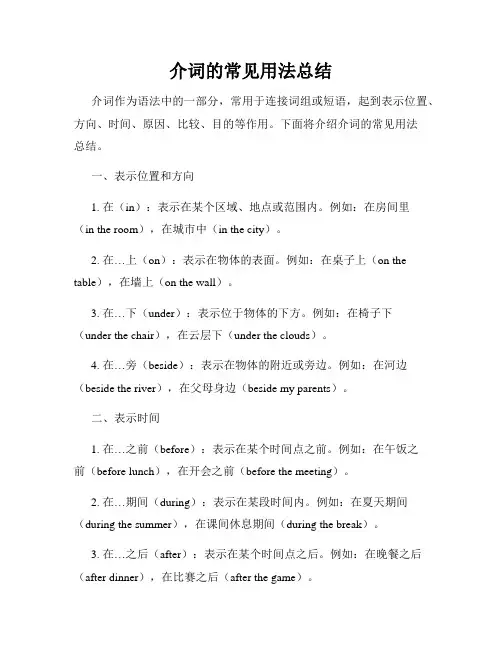
介词的常见用法总结介词作为语法中的一部分,常用于连接词组或短语,起到表示位置、方向、时间、原因、比较、目的等作用。
下面将介绍介词的常见用法总结。
一、表示位置和方向1. 在(in):表示在某个区域、地点或范围内。
例如:在房间里(in the room),在城市中(in the city)。
2. 在…上(on):表示在物体的表面。
例如:在桌子上(on the table),在墙上(on the wall)。
3. 在…下(under):表示位于物体的下方。
例如:在椅子下(under the chair),在云层下(under the clouds)。
4. 在…旁(beside):表示在物体的附近或旁边。
例如:在河边(beside the river),在父母身边(beside my parents)。
二、表示时间1. 在…之前(before):表示在某个时间点之前。
例如:在午饭之前(before lunch),在开会之前(before the meeting)。
2. 在…期间(during):表示在某段时间内。
例如:在夏天期间(during the summer),在课间休息期间(during the break)。
3. 在…之后(after):表示在某个时间点之后。
例如:在晚餐之后(after dinner),在比赛之后(after the game)。
三、表示原因1. 因为(because of):表示由于某个原因。
例如:因为天气原因(because of the weather),因为健康问题(because of health issues)。
2. 由于(due to):表示由于某种情况或原因。
例如:由于交通堵塞(due to traffic congestion),由于工作原因(due to work commitments)。
四、表示比较1. 像…一样(like):表示两个或多个事物在某些方面的相似性。
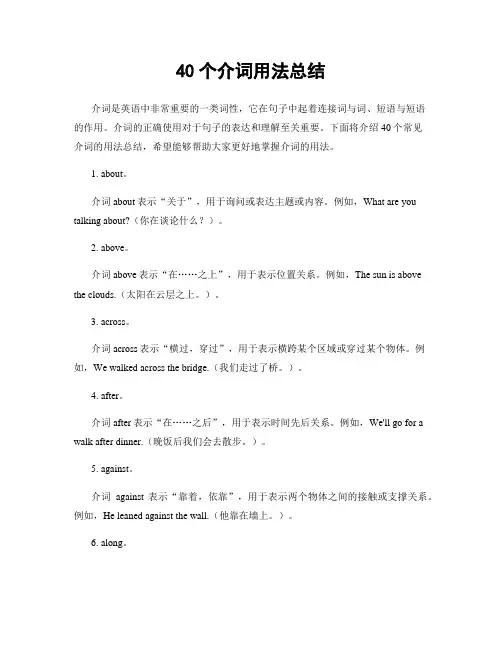
40个介词用法总结介词是英语中非常重要的一类词性,它在句子中起着连接词与词、短语与短语的作用。
介词的正确使用对于句子的表达和理解至关重要。
下面将介绍40个常见介词的用法总结,希望能够帮助大家更好地掌握介词的用法。
1. about。
介词about表示“关于”,用于询问或表达主题或内容。
例如,What are you talking about?(你在谈论什么?)。
2. above。
介词above表示“在……之上”,用于表示位置关系。
例如,The sun is above the clouds.(太阳在云层之上。
)。
3. across。
介词across表示“横过,穿过”,用于表示横跨某个区域或穿过某个物体。
例如,We walked across the bridge.(我们走过了桥。
)。
4. after。
介词after表示“在……之后”,用于表示时间先后关系。
例如,We'll go for a walk after dinner.(晚饭后我们会去散步。
)。
5. against。
介词against表示“靠着,依靠”,用于表示两个物体之间的接触或支撑关系。
例如,He leaned against the wall.(他靠在墙上。
)。
6. along。
介词along表示“沿着”,用于表示沿着某个方向或路线。
例如,We walked along the river.(我们沿着河边走。
)。
7. amid。
介词amid表示“在……之中”,用于表示某个场所或环境中。
例如,The children played happily amid the flowers.(孩子们在花丛中快乐地玩耍。
)。
8. among。
介词among表示“在……之中”,用于表示三个或三个以上的人或物之间的关系。
例如,She is among the top students in her class.(她是班里的尖子学生之一。
)。
9. around。
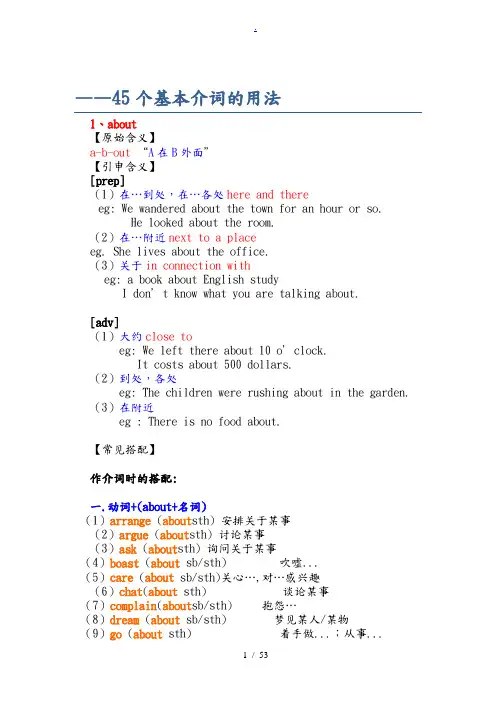
——45个基本介词的用法1、about【原始含义】a-b-out “A在B外面”【引申含义】[prep](1)在…到处,在…各处here and thereeg: We wandered about the town for an hour or so.He looked about the room.(2)在…附近next to a placeeg. She lives about the office.(3)关于in connection witheg: a book about English studyI don’t know what you are talking about.[adv](1)大约close toeg: We left there about 10 o’clock.It costs about 500 dollars.(2)到处,各处eg: The children were rushing about in the garden.(3)在附近eg : There is no food about.【常见搭配】作介词时的搭配:一.动词+(about+名词)(1)arrange (about sth) 安排关于某事(2)argue (about sth) 讨论某事(3)ask (about sth) 询问关于某事(4)boast (about sb/sth) 吹嘘...(5)care (about sb/sth)关心…,对…感兴趣(6)chat(about sth) 谈论某事(7)complain(about sb/sth) 抱怨…(8)dream (about sb/sth) 梦见某人/某物(9)go (about sth) 着手做...;从事...(10)hear (about sth) 听说...(11)know(about sth) 了解...(12)learn (about sth) 得知某事(13)put (about sth)散布(谣言等)(14)quarrel (about sth) 为...争吵(15)see (about sth) 负责处理...(16)talk(about sth) 谈论...(17)think (about sth) 考虑..(18)warn sb (about sth) 告诫某人关于某事(19)wonder(about sb/sth) 对.. 好奇(20)worry(about sb/sth) 对...担心二、名词+(about+名词)(1)concern (about sb/sth)对…的关心/关怀(2)curiosity (about sb/sth) 对…的好奇(3)doubt (about sb/sth)对…的怀疑(4)ethusiasm (about sth) 对…的热情(5)information (about sb/sth) 关于…的信息(6)remark (about sth) 对…的评论(7)opinion (about sth)对…的意见(8)view (about sb/sth) 对...的观点三、be+adj+(about+名词)(1)be angry(about sth)为…而生气(2)be anxious(about sth)为…忧虑(3)be careful(about sth)当心…(4)be cautious (about sth) 谨防...;对...持谨慎态度(5)be certain(about sth)确信关于某事(6)be curious (about sth)对…感到好奇(7)be disappointed(about sth)对…感到失望(8)be excited(about sth)对…感到兴奋(9)be glad/happy(about sth)对…感到高兴(10)be hopeful(about sth)对…抱有希望(11)be crazy/mad/wild(about sth)对…痴狂;酷爱某事(12)be nervous(about sth)为…感到不安/因...感到紧(13)be optimistic/positive (about sth)对...是积极乐观的(14)be particular (about sb/sth) 对... 讲究,挑剔(15)be sad(about sth)为…而难过(16)be serious(about sth)对…认真(17)be sorry (about sth) 对...抱歉作副词时的搭配:名词+动词+about(1)sth come about某事发生(2)sth getabout某事(尤指消息等)传开(3)sb turn about某人转身(4)sb wanderabout某人徘徊,游荡(5)sb walk about某人走来走去2、above【原始含义】a-b-over“A在B上方”【引申含义】prep.(1)在…上方at or to a higher place than sth/sbeg: The sun rose above the horizon.(2)数目大于…/重量超过…/价格(能力、地位)高于…more than sth.; greater in number,levelor age thansb./sth.eg: There is nothing in the store above 50 cents.(3)重要性或质量超过、胜过of greater importance or of higher quality than sb/stheg. I rate her above most other players of her age.(4)声音超过…louder or clearer than another soundeg: I couldn’t hear her above the noise of the traffic.(5)不至于,不屑于做某事too good or too honest to do stheg. She is above suspicion.【常见搭配】一、动词+(above+名词)(1)live ( above one’s income) 入不敷出地生活(2)put A(above B)把A看得比B更重要(3)rise (above sth) 克服...,不受....的影响(4)talk (above one’s head) 高深莫测地谈论二、be+(above+名词)(1)be(aboveoneself)兴高采烈= be in one’s high spirit(2)be (above one’s head)难以理解/超出某人理解能力3、across【原始含义】a-grass“一片草坪”,across指在平面上经过,就像人走过一片草坪那样。
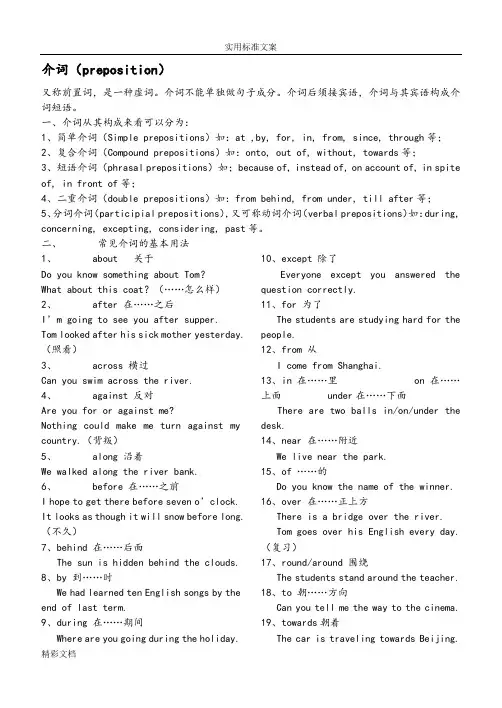
介词(preposition)又称前置词,是一种虚词。
介词不能单独做句子成分。
介词后须接宾语,介词与其宾语构成介词短语。
一、介词从其构成来看可以分为:1、简单介词(Simple prepositions)如:at ,by, for, in, from, since, through等;2、复合介词(Compound prepositions)如:onto, out of, without, towards等;3、短语介词(phrasal prepositions)如;because of, instead of, on account of, in spite of, in front of等;4、二重介词(double prepositions)如:from behind, from under, till after等;5、分词介词(participial prepositions),又可称动词介词(verbal prepositions)如:during, concerning, excepting, considering, past等。
二、常见介词的基本用法1、 about 关于Do you know something about Tom?What about this coat?(……怎么样)2、 after 在……之后I’m going to see you after supper. Tom looked after his sick mother yesterday.(照看)3、 across 横过Can you swim across the river.4、 against 反对Are you for or against me?Nothing could make me turn against my country.(背叛)5、 along 沿着We walked along the river bank.6、 before 在……之前I hope to get there before seven o’clock. It looks as though it will snow before long.(不久)7、behind 在……后面The sun is hidden behind the clouds.8、by 到……时We had learned ten English songs by the end of last term.9、during 在……期间Where are you going during the holiday. 10、except 除了Everyone except you answered the question correctly.11、for 为了The students are studying hard for the people.12、from 从I come from Shanghai.13、in 在……里 on 在……上面 under在……下面There are two balls in/on/under the desk.14、near 在……附近We live near the park.15、of ……的Do you know the name of the winner.16、over 在……正上方There is a bridge over the river.Tom goes over his English every day.(复习)17、round/around 围绕The students stand around the teacher.18、to 朝……方向Can you tell me the way to the cinema.19、towards朝着The car is traveling towards Beijing.20、with 和……一起me?Would you like to go to the cinema with学习这些介词时可以先记住它的汉语意思,然后参照例句来加深理解,并在今后的学习中加以灵活运用。
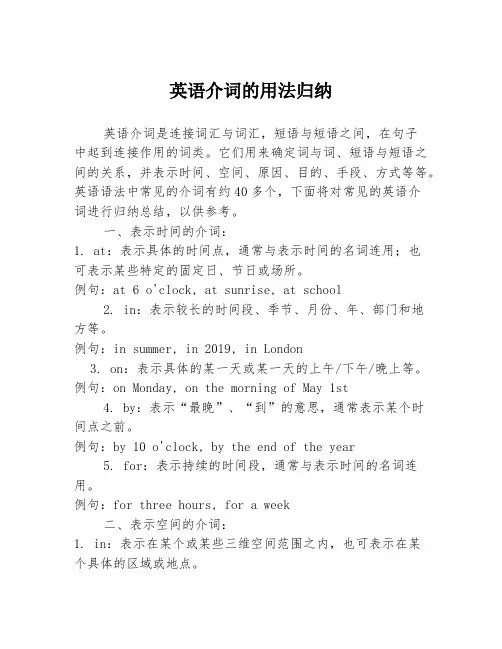
英语介词的用法归纳英语介词是连接词汇与词汇,短语与短语之间,在句子中起到连接作用的词类。
它们用来确定词与词、短语与短语之间的关系,并表示时间、空间、原因、目的、手段、方式等等。
英语语法中常见的介词有约40多个,下面将对常见的英语介词进行归纳总结,以供参考。
一、表示时间的介词:1. at:表示具体的时间点,通常与表示时间的名词连用;也可表示某些特定的固定日、节日或场所。
例句:at 6 o'clock, at sunrise, at school2. in:表示较长的时间段、季节、月份、年、部门和地方等。
例句:in summer, in 2019, in London3. on:表示具体的某一天或某一天的上午/下午/晚上等。
例句:on Monday, on the morning of May 1st4. by:表示“最晚”、“到”的意思,通常表示某个时间点之前。
例句:by 10 o'clock, by the end of the year5. for:表示持续的时间段,通常与表示时间的名词连用。
例句:for three hours, for a week二、表示空间的介词:1. in:表示在某个或某些三维空间范围之内,也可表示在某个具体的区域或地点。
例句:in the room, in the park2. on:表示在某个平面面上,通常用来表示地点。
例句:on the table, on the wall3. at:表示在某个具体的地点或位置。
例句:at the door, at the bus stop4. by:表示“靠近”、“经过”等含义。
例句:by the river, by the window5. between:表示在两个或两个以上的物体或位置之间。
例句:between two mountains, between the buildings6. among:表示在三个或三个以上的物体或位置之间。
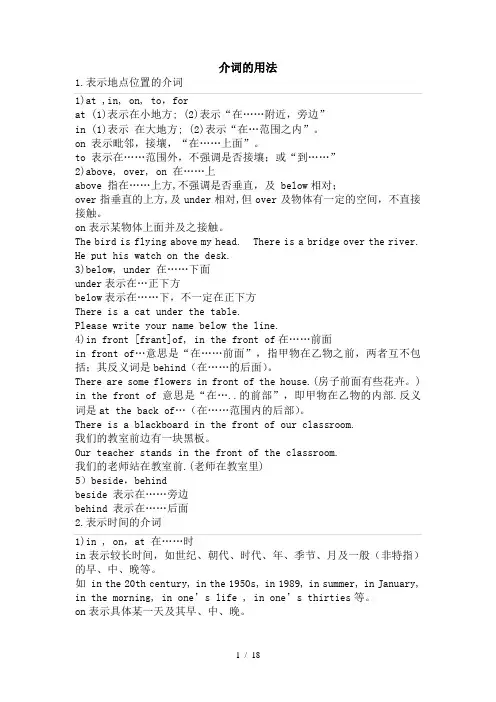
介词的用法1.表示地点位置的介词1)at ,in, on, to,forat (1)表示在小地方; (2)表示“在……附近,旁边”in (1)表示在大地方; (2)表示“在…范围之内”。
on 表示毗邻,接壤,“在……上面”。
to 表示在……范围外,不强调是否接壤;或“到……”2)above, over, on 在……上above 指在……上方,不强调是否垂直,及 below相对;over指垂直的上方,及under相对,但over及物体有一定的空间,不直接接触。
on表示某物体上面并及之接触。
The bird is flying above my head. There is a bridge over the river. He put his watch on the desk.3)below, under 在……下面under表示在…正下方below表示在……下,不一定在正下方There is a cat under the table.Please write your name below the line.4)in front [frant]of, in the front of在……前面in front of…意思是“在……前面”,指甲物在乙物之前,两者互不包括;其反义词是behind(在……的后面)。
There are some flowers in front of the house.(房子前面有些花卉。
) in the front of 意思是“在…..的前部”,即甲物在乙物的内部.反义词是at the back of…(在……范围内的后部)。
There is a blackboard in the front of our classroom.我们的教室前边有一块黑板。
Our teacher stands in the front of the classroom.我们的老师站在教室前.(老师在教室里)5)beside,behindbeside 表示在……旁边behind 表示在……后面2.表示时间的介词1)in , on,at 在……时in表示较长时间,如世纪、朝代、时代、年、季节、月及一般(非特指)的早、中、晚等。
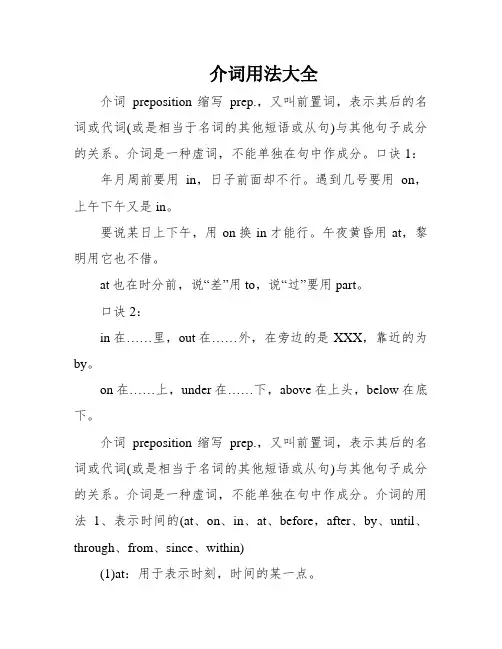
介词用法大全介词preposition缩写prep.,又叫前置词,表示其后的名词或代词(或是相当于名词的其他短语或从句)与其他句子成分的关系。
介词是一种虚词,不能单独在句中作成分。
口诀1:年月周前要用in,日子前面却不行。
遇到几号要用on,上午下午又是in。
要说某日上下午,用on换in才能行。
午夜黄昏用at,黎明用它也不借。
at也在时分前,说“差”用to,说“过”要用part。
口诀2:in在……里,out在……外,在旁边的是XXX,靠近的为by。
on在……上,under在……下,above在上头,below在底下。
介词preposition缩写prep.,又叫前置词,表示其后的名词或代词(或是相当于名词的其他短语或从句)与其他句子成分的关系。
介词是一种虚词,不能单独在句中作成分。
介词的用法1、表示时间的(at、on、in、at、before,after、by、until、through、from、since、within)(1)at:用于表示时刻,时间的某一点。
XXX在中午XXX在夜间XXX目前(2)on:用于星期,某天,某一天的上午、下午、晚上(指具体的某一天时,一律用) onsunday在星期天XXX在星期天的上午on march 8在3月8日(3)in:用于透露表现周、月、季候、年、泛指上午、下午、清晨。
in 1999在1999年XXX在11月份in summer在夏季in XXX在下午i think he will be back in an hour。
我想他一小时后就会回来。
i heard that she would be back in a month.我听说她一个月后回来的。
by the time i arrived,she had already gone。
在我到达之前,她已经走了。
XXX-four hours without rest。
XXX常常工作24小时而不休息。
during the lifetime of one man,XXX。
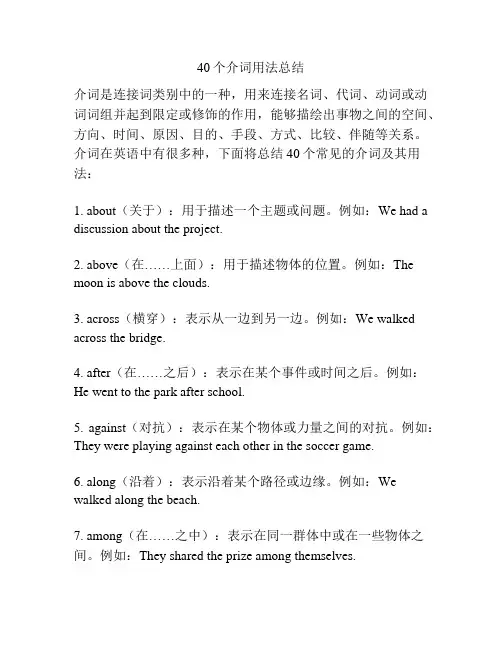
40个介词用法总结介词是连接词类别中的一种,用来连接名词、代词、动词或动词词组并起到限定或修饰的作用,能够描绘出事物之间的空间、方向、时间、原因、目的、手段、方式、比较、伴随等关系。
介词在英语中有很多种,下面将总结40个常见的介词及其用法:1. about(关于):用于描述一个主题或问题。
例如:We had a discussion about the project.2. above(在……上面):用于描述物体的位置。
例如:The moon is above the clouds.3. across(横穿):表示从一边到另一边。
例如:We walked across the bridge.4. after(在……之后):表示在某个事件或时间之后。
例如:He went to the park after school.5. against(对抗):表示在某个物体或力量之间的对抗。
例如:They were playing against each other in the soccer game.6. along(沿着):表示沿着某个路径或边缘。
例如:We walked along the beach.7. among(在……之中):表示在同一群体中或在一些物体之间。
例如:They shared the prize among themselves.8. around(在……周围):表示围绕某个物体或区域。
例如:She ran around the track.9. before(在……之前):表示在某个事件或时间之前。
例如:Please finish your homework before dinner.10. behind(在……后面):表示在某个物体或地点的后面。
例如:He hid behind the tree.11. below(在……下面):表示在某个物体或地点的下面。
例如:The book is below the desk.12. beneath(在……下方):表示在某个物体的下方。
高中英语知识点归纳介词的用法和种类高中英语知识点归纳:介词的用法和种类介词是英语语法中一个重要的部分,它用来表达词与词、短语与短语之间的关系。
在英语中,介词的使用非常广泛,掌握好介词的用法和种类对于理解和运用英语具有重要意义。
本文将对高中英语中常见的介词用法和种类进行归纳总结。
一、基本介词用法(1)表示位置和方向:at, in, on, over, under, above, below, beside, between等。
例如:- The cat is on the table.(猫在桌子上。
)- My house is between the bank and the supermarket.(我的房子在银行和超市之间。
)(2)表示时间:at, in, on, until, before, after, during等。
例如:- I always get up early in the morning.(我每天早上都起得很早。
)- We have an English class on Monday.(我们星期一有英语课。
)(3)表示原因和目的:for, because of, due to等。
例如:- He apologized to her for being late.(他因为迟到向她道歉。
)- We canceled the trip due to the bad weather.(因为天气恶劣,我们取消了这次旅行。
)(4)表示方式和手段:by, with等。
例如:- We usually go to school by bus.(我们通常乘公交车去上学。
)- She writes with a pen.(她用钢笔写字。
)(5)表示比较和对照:like, unlike等。
例如:- He is like his father.(他像他父亲。
)- This book is unlike any other I've read.(这本书和我读过的其他书都不一样。
高中英语中常见的介词用法总结1. in:表示在某个范围、实体或地点之内。
例如:in the park(在公园里)、in the morning(在早晨)。
in:表示在某个范围、实体或地点之内。
例如:in the park(在公园里)、in the morning (在早晨)。
2. on:表示在某个表面、时间或日子之上。
例如:on the table (在桌子上)、on Monday(在星期一)。
on:表示在某个表面、时间或日子之上。
例如:on the table(在桌子上)、on Monday(在星期一)。
3. at:表示在某个地点、时间或状态。
例如:at the cinema(在电影院)、at 9 o'clock(在9点钟)。
at:表示在某个地点、时间或状态。
例如:at the cinema(在电影院)、at 9 o'clock(在9点钟)。
4. by:表示通过某种交通方式、靠近某个地点或借助某人之类。
例如:by bus(乘公交车)、by the river(在河边)。
by:表示通过某种交通方式、靠近某个地点或借助某人之类。
例如:by bus(乘公交车)、by the river(在河边)。
5. to:表示方向、目标或接触某物。
例如:go to school(去学校)、give it to me(给我)。
to:表示方向、目标或接触某物。
例如:go to school(去学校)、give it to me(给我)。
7. with:表示陪伴、带有某种特征或使用某物。
例如:play with friends(和朋友一起玩)、a book with a red cover(一本封面是红色的书)。
with:表示陪伴、带有某种特征或使用某物。
例如:play with friends(和朋友一起玩)、a book with a red cover(一本封面是红色的书)。
8. for:表示目的、目标或所属关系。
介词用法归纳与总结介词是英语中非常重要的一部分,它用于连接名词或代词与其他句子成分,表达位置、时间、原因、方式等概念。
正确使用介词能够准确表达自己的意思,加强句子的连贯性和表达的精确度。
本文将对常见的介词及其用法进行归纳与总结。
1. 位置关系介词用于表示物体或人的位置关系,常见的介词有:in、on、at、under、over等。
- in:表示在某个区域或范围内。
例如:in the park(在公园里)、in the house(在房子里)。
- on:表示在某个表面或位置上。
例如:on the table(在桌子上)、on the beach(在海滩上)。
- at:表示在某个具体位置。
例如:at the bus stop(在公车站)、at school(在学校)。
- under:表示在某物之下。
例如:under the tree(在树下)、under the bed(在床下)。
- over:表示在某物之上。
例如:over the bridge(在桥上)、over the clouds(在云上)。
2. 时间关系介词用于表示时间关系,常见的介词有:at、on、in、before、after、during等。
- at:表示具体时间点。
例如:at 7 o'clock(在7点)、at midnight (在午夜)。
- on:表示某个具体的日期或星期几。
例如:on Monday(在星期一)、on Christmas Day(在圣诞节)。
- in:表示一个时间段或月份。
例如:in the morning(在早上)、in July(在七月)。
- before:表示在某个时间之前。
例如:before sunset(在日落之前)、before the meeting(在会议之前)。
- after:表示在某个时间之后。
例如:after breakfast(在早餐之后)、after the show(在演出之后)。
英语介词用法最全总结英语介词是学习英语语法中非常重要的一部分,它们在句子中起着连接词的作用,指示名词、代词或动词与其他词之间的关系。
正确地使用介词可以使句子更加生动、准确,并且对于掌握英语的表达能力至关重要。
下面将为大家总结英语中常见的介词用法。
1. 位置(Location)介词在描述位置时非常常用。
例如,在描述位置关系时可以使用"in"、"on"、"under"、"beside"、"in front of" 等。
比如:The book is on the table(书在桌子上)。
2. 时间(Time)表达时间关系时,介词也是必不可少的。
例如,在描述时间时可以使用 "at"、"in"、"on"、"during"、"for" 等。
比如:I will meet you at 7 o'clock(我会在7点见你)。
3. 方式(Manner)介词在描述方式时的使用较为灵活。
比如:She walked with confidence(她自信地走着)。
4. 原因(Cause)介词可以用于表达原因。
比如:They canceled the trip due to bad weather(由于天气恶劣,他们取消了旅行)。
5. 目的(Purpose)介词也能表达目的。
比如:He went to the store to buy some groceries (他去商店买些食品)。
6. 所属关系(Possession)介词可以用于表达所属关系。
比如:This book belongs to me(这本书是我的)。
7. 比较(Comparison)在进行比较时,介词也可以派上用场。
比如:I am taller than my sister(我比我妹妹高)。
高中英语知识点归纳介词的用法与搭配高中英语知识点归纳:介词的用法与搭配介词在英语中起到连接词或短语之间关系的作用。
熟练掌握介词的用法与搭配对于理解和运用英语语法和表达非常重要。
下面是对高中英语中常用介词的用法与搭配进行归纳总结。
一、介词的基本用法1. of:表示所属关系、来源、构成等。
- The book of John is on the table.(约翰的书在桌子上。
)- The Statue of Liberty was a gift from France.(自由女神像是法国赠送的。
)2. in:表示位置、时间、状态等。
- He is in the room.(他在房间里。
)- I will see you in an hour.(我一个小时后会见你。
)3. to:表示目标、方向等。
- She went to the library to borrow some books.(她去图书馆借书。
) - Please give this letter to him.(请把这封信交给他。
)4. at:表示位置、时间等。
- We will meet at the park.(我们将在公园见面。
)- I have a meeting at 9 o'clock.(我9点有个会议。
)5. for:表示目的、原因等。
- I bought a gift for my friend's birthday.(我为我朋友的生日买了一份礼物。
)- He apologized for being late.(他为迟到而道歉。
)二、介词与名词的常见搭配1. on:- on the table(在桌子上)- on Monday(在星期一)2. in:- in the room(在房间里)- in the morning(在早上)3. at:- at the park(在公园)- at the party(在聚会上)4. to:- go to school(去上学)- talk to the teacher(和老师交谈)5. for:- a gift for her(给她的礼物)- thanks for your help(感谢你的帮助)三、介词与动词的常见搭配1. look at:看- He looked at the picture on the wall.(他看着墙上的画。
介词常用介词的用法和搭配介词是连接词和短语成分的一种词类,它主要用来表示名词与其他句子成分之间的关系。
在英语中,有许多常用的介词及其常见的用法和搭配。
本文将介绍这些常用介词的用法和搭配。
一、关于位置的介词1. In(在、在…里面):用于表示在某个范围、区域或地点之内。
例如:in the house(在房子里)、in the city(在城市里)。
2. On(在、在…上面):用于表示在某个表面、位置或物体之上。
例如:on the table(在桌子上)、on the wall(在墙上)。
3. At(在、在…处):用于表示在某个地方、位置或事件发生处。
例如:at the park(在公园)、at school(在学校)。
4. Under(在、在…下面):用于表示在某个物体、位置或概念之下。
例如:under the bed(在床底下)、under the tree(在树下)。
二、关于方向的介词1. To(到、向):表示移动或指向某个地方、位置。
例如:go to the beach(去海滩)、look to the left(向左看)。
2. From(从):表示起点、来源或出发地。
例如:come from Japan (来自日本)、run from the house(从房子里跑出来)。
三、关于时间的介词1. On(在、在…时):用于表示某一具体日子或星期几。
例如:on Monday(在星期一)、on my birthday(在我的生日当天)。
2. At(在、在…时):用于表示某一具体时间点。
例如:at 7o'clock(在7点钟)、at midnight(在午夜时分)。
3. In(在、在…期间):用于表示某一段时间或具体时间之前。
例如:in the morning(在早晨)、in May(在五月份)。
四、关于方式的介词1. With(用、带有):表示使用某种工具或伴随某人或某物。
例如:write with a pen(用钢笔写)、go with friends(和朋友一起去)。
——45个基本介词的用法1、about【原始含义】a-b-out “A在B外面”【引申含义】[prep](1)在…到处,在…各处here and thereeg: We wandered about the town for an hour or so.He looked about the room.(2)在…附近next to a place*eg. She lives about the office.(3)关于in connection witheg: a book about English studyI don’t know what you are talking about.[adv](1)大约close toeg: We left there about 10 o’clock.It costs about 500 dollars.(2)到处,各处<eg: The children were rushing about in the garden.(3)在附近eg : There is no food about.【常见搭配】作介词时的搭配:一.动词+(about+名词)(1)arrange (about sth) 安排关于某事&(2)argue (about sth) 讨论某事(3)ask (about sth) 询问关于某事(4)boast (about sb/sth) 吹嘘...(5)care (about sb/sth)关心…,对…感兴趣(6)chat(about sth) 谈论某事(7)complain(about sb/sth) 抱怨…(8)dream (about sb/sth) 梦见某人/某物(9)go (about sth) 着手做...;从事...(10)hear (about sth) 听说...(11)know(about sth) 了解...、(12)learn (about sth) 得知某事(13)put (about sth)散布(谣言等)(14)quarrel (about sth) 为...争吵(15)see (about sth) 负责处理...(16)talk(about sth) 谈论...(17)think (about sth) 考虑..(18)warn sb (about sth) 告诫某人关于某事(19)wonder(about sb/sth) 对.. 好奇(20)worry(about sb/sth) 对...担心|二、名词+(about+名词)(1)concern (about sb/sth) 对…的关心/关怀(2)curiosity (about sb/sth) 对…的好奇(3)doubt (about sb/sth) 对…的怀疑(4)ethusiasm (about sth) 对…的热情(5)information (about sb/sth) 关于…的信息(6)remark (about sth) 对…的评论(7)opinion (about sth) 对…的意见(8)view (about sb/sth) 对...的观点~三、be+adj+(about+名词)(1)be angry (about sth) 为…而生气(2)be anxious(about sth) 为…忧虑(3)be careful(about sth) 当心…(4)be cautious (about sth) 谨防...;对...持谨慎态度(5)be certain (about sth) 确信关于某事(6)be curious (about sth) 对…感到好奇(7)be disappointed (about sth) 对…感到失望(8)be excited (about sth) 对…感到兴奋(9)be glad/happy (about sth) 对…感到高兴:(10)be hopeful (about sth) 对…抱有希望(11)be crazy/mad/wild (about sth)对…痴狂;酷爱某事(12)be nervous (about sth)为…感到不安/因...感到紧张(13)be optimistic/positive (about sth)对...是积极乐观的(14)be particular (about sb/sth) 对... 讲究,挑剔(15)be sad (about sth) 为…而难过(16)be serious (about sth) 对…认真-(17)be sorry (about sth) 对...抱歉作副词时的搭配:名词+动词+about(1)sth come about某事发生(2)sth get about某事(尤指消息等)传开(3)sb turn about某人转身(4)sb wander about某人徘徊,游荡(5)sb walk about 某人走来走去}2、above【原始含义】a-b-over“A在B上方”【引申含义】prep.(1)在…上方at or to a higher place than sth/sbeg: The sun rose above the horizon.(2)数目大于…/重量超过…/价格(能力、地位)高于…more than sth.; greater in number, level or age than sb./sth.eg: There is nothing in the store above 50 cents.(3)重要性或质量超过、胜过`of greater importance or of higher quality than sb/sth eg. I rate her above most other players of her age.(4)声音超过…louder or clearer than another sound eg: I couldn’t hear her above the noise of the traffic.(5)不至于,不屑于做某事too good or too honest to do stheg. She is above suspicion.【常见搭配】'一、动词+(above+名词)(1)live ( above one’s income) 入不敷出地生活(2)put A(above B) 把A看得比B更重要(3)rise (above sth) 克服...,不受....的影响(4)talk (above one’s head) 高深莫测地谈论二、be+(above+名词)(1)be (above oneself )兴高采烈= be in one’s high spirit(2)be (above one’s head)/难以理解/超出某人理解能力3、across【原始含义】a-grass“一片草坪”,across指在平面上经过,就像人走过一片草坪那样。
【引申含义】prep.(1)穿过from one side to the other sideeg: She walked across the road.(2)在...对面on the other side of sth.eg: The bar is just across the street.:(3)交叉crosseg: He sat with his arms across his chest.(4)在...各处,遍及... everywhereeg. The opinion is common across the university.【常见搭配】动词+(across+名词)(1)A come(across B) A偶遇B(2)A cut(across B) A走B捷径;A打断B(3)A go(across B) A穿过B}(4)A put(across B) A 解释清楚B;A把B送到对岸(5)A run(across B) A横穿B;A偶然碰到B4、after【原始含义】“A在B之后(强调顺序)”【引申含义】(1)在…之后(时间顺序、空间顺序)later than sth; following sth in timeeg: After dinner, they went out for a walk.(1)|(2)在…后面,仅次于(按重要性)next to the following eg. Your name comes after mine in the list.(3)与…对照、对比in contrast to stheg. It was cool after the heat outside.(4)照着…的样子following the example of sb/stheg: Read the sentence after me, please.[adv]后来、以后later in time, afterwordseg:Soon after, she came back to her hometown.The prince and princess lived happily ever after.`【常见搭配】作介词时的搭配一、名词+动词+(after+名词)(1)A chase (after B) A追赶/追求B(2)A go (after B) A追逐B.(3)A look (after B) A照顾B.(4)A model (after B) A 以B为榜样、原型;A效仿B (5)A name (after B) A用B作名字.(6)A run (after B) A追求/追赶/追逐B.*(7)A search (after B) A研究B.(8)A see (after B) A照顾B(9)A seek (after B) A寻找B.(10)A take (after B) A与B相像.二、(after+名词)(1)(after a while) 过了一会,不久(2)(after all) 毕竟;终究(3)(after one’s own heart) 正合...的心意;5、against(【原始含义】a-g-a“相对”【引申含义】(1)碰着、靠着touching, close to or hitting sb/sth eg: She was leaning against a tree.(2)反对opposing or disagreeing with sb./stheg: We should fight against crimes.(3)预防in order to prevent sth from happening eg: Save money against a rainy day. 未雨绸缪((4)违反(违反法律、制度)eg: It is against the law to hunt tigers.(5)不利于not to the advantage or favor of sb./sth eg: What he said is against him.(6)映衬with sth in the background as a contrast Eg. The red flag stood out clearly against the blue sky. (7)和…相比in contrast to stheg. You must weigh the benefits against the cost.【常见搭配】一、动词+(against+名词)、(1)act (against sth) 违反...(2)argue (against sth) 为...而争辩/据理反对(3)compete (against sb) 与某人比赛/竞争/对抗(4)decide (against sth/doing sth)考虑后不做某事/声明反对某事(5)declare (against sb/sth) 表态反对...(6)fight (against sth) 反对…;与...做斗争(7)go (against sth) 违反…(8)inform (against sb) 告发、检举某人(9)lean (against sth) 靠着某物/斜靠某物&(10)offend (against sth) 违犯…(11)press (against sth) 压在…上(12)protect (against sth) 保护免受…的伤害(13)prepare (against sth) 防备…(14)strike (against sth) 罢工抗议...(15)struggle (against sb/sth) 与...搏斗/反抗(16)turn (against sth) 背叛…(17)vote (against sth) 投票反对…(18)warn sb (against sth) 提醒某人提防某事?二、be+adj+(against+名词)(1)be prejudiced (against sb/sth) 对... 持有偏见(2)be proof (against sth) 可防止…的(3)be set (against sth) 坚决反对...6、around【原始含义】a+round“A在一个圆里面(在一定范围内)”【引申含义】[prep](1)在…周围,围绕surrounding sb/sth&eg: There are many bars around the town.(2)在附近,到处in or to many placeseg: I showed him around our campus.[adv](1)大约approximatelyeg: There are around 1000 people watching the game.(2)在周围eg : How can you make the wheel go around(3)在附近、到处eg: I ran around to find him.*【常见搭配】作介词时一、动词+(around+名词)(1)center (around sth) 以...为中心,集中于...(2)look (around sth) 环顾...;游览...;(3)wrap (around sth) 缠绕住...;环绕...;二、around +名词(1)(around the corner) ...靠近、临近、快来了;(2)(around the clock) 日夜不停地;夜以继日地)作副词时名词+动词+around(1)sb gaze around某人向四周看,环视(2)sth get around某事(尤指消息、谣言等)走动、流传(3)sb/sth turn around某人或某物转身%7、at【原始含义】“在场所,时间上的一点”【引申含义】prep.(1)小地点,或小时间点used to say where sb/sth is or when sth happenseg: Usually, he is (at his office) (in the morning).She went to school (at 8 o’clock) (in the morning).(2)在几岁时the age (at which sb does sth)、eg: She was married (at 23).(3)向,朝某人或某物in the direction towards sb/sth eg: Don’t point at me.knock at the door, shoot at the tiger, aim at the enemy(4)从相隔…远的地方the distance away from stheg: Can you read that poster (at fifty miles)You’d better keep him (at a distance).(5)处于某种状态the situation sb/sth is ineg: Mr. Smith is (at lunch).The country is (at war).{Bill was (at his best) in college.(at one’s best: 某人的辉煌时期)(6)在某方面in terms of…eg: I am not good (at football).(7)表示引发某种情绪或动作的原因to show the cause of stheg: He showed no sign of pleasure (at seeing her).I was delighted (at the result)+.【常见搭配】一、动词+(at+名词)'(1)aim(at sth)以…为目标;瞄准…;针对…;(2)arrive(at sth) 到达某地或某种程度(3)blush (at sth) 对...感到脸红;(4)come (at sb/sth) 攻击某人;发现某事(5)fire (at sth) 向...开火(6)gaze (at sb/sth) 凝视, 注视...(7)get (at sth ) 到达, 接近...;着手...;暗指...;意知...;(8)glance (at sb/sth) 一瞥,扫视...(9)glare (at sb/sth) 对...怒目而视(10)grab/grasp (at sb/sth) 抓住...【(11)knock(at sth) 敲…(12)laugh (at sb) 嘲笑某人(13)look(at sb/sth) 看…(14)point (at sb/sth) 指向/ 瞄准/ 针对…(15)run (at sb/sth) 向某人冲去;达到某种水平(16)shoot(at sth) 朝…射击(17)shout (at sb) 朝某人喊叫(18)smile (at sb) 向某人微笑(19)target (at sb/sth) 瞄准…,以…为目标(20)wonder (at sth) 对…好奇/对…感到吃惊@(21)yell (at sb) 对某人大喊大叫二、(at+名词)(1)(at the age) (of some number) 在几岁(2)(at an altitude) (of some number) 在某个高度(3)(at the cost/expense)(of sth) 以...为代价(4)(at the end) (of sth) 在...的结尾(5)(at the request) (of sb) 应某人的请求(6)(at the risk) (of sth/doing sth) 冒着....的风险(7)(at the sight)(of sb/sth) 一看见....(8)(at a speed)(of some number)以...的速度%(9)(at the thought)(of sb/sth) 一想到...(10)(at birth) 出生时(11)(at bottom) 其实,实际上(12)(at one’s command) 听候...的差遣(13)(at the corner) 在拐角处(14)(at dawn/daybreak) 在黎明, 在拂晓(15)(at a discount) 减价、折扣(16)(at first) 最初,开始时(17)(at hand) 在手边,即将发生(18)(at home) 在家/国内~(19)(at large) 自由,逍遥法外(20)(at length) 详细地(21)(at last) 最后,终于(22)(at least) 至少,起码(23)(at leisure) 有空,闲暇时(24)(at the moment) 现在,眼下...(25)(at any price) 不惜任何代价,无论如何(26)(at one time) 过去,曾经,一度(27)(at the same time) 同时(28)(at work)在工作$三、be+adj+(at+名词)(1)be angry (at sb/sth) 对...生气(2)be competent (at sth) 在...方面有能力(3)be delighted (at sth) 对...感到非常高兴(4)be disappointed (at sb/sth) 对...感到失望(5)be dissatisfied (at sb/sth) 对...不满意(6)be expert (at sth/doing sth) 专长,擅长于,精通(7)be skilled (at sth/doing sth) 在...方面有技能,熟练(8)be gifted (at sth/doing sth) 在...有天赋(9)be good (at sth/doing sth) 擅长...|(10)be hopeless (at sth/doing sth)对...感到绝望;对...一筹莫展(11)be mad (at sb/sth) 对..愤怒(12)be surprised (at sb/sth) 对...感到吃惊(13)be terrfied (at sth/doing sth) 被... 惊吓(14)be weak (at sth/doing sth) 在...方面欠缺,差8、before【原始含义】be+fore“在…之前“(时间、空间、顺序)”【引申含义】prep.((1)时间上earlier in timeeg: Please come back (before 10:00pm).(2)空间上earlier in positioneg: Don’t put the cart (before the horse).(3)顺序上earlier in order or arrangementeg: Health should come (before wealth).(4)当(某人)面in the presence of sbeg : She charged him of murder (before the jury).【常见搭配】:>一、动词+(before+名词)(1)A come (before B) A在B之上,比B更重要(2)complain (before sb) 在某人面前控诉(3)go (before sb) 出现在某人面前(4)put/set A (before B) 把A看的比B重要(5)stand (before sb/sth) 站立在…前面二、(before +名词)(1)(before day) 破晓之前(2)(before long) 不久以后(3)(before one's eyes) 当着某人的面(4)(before time) 提前(5)(before the wind) 顺风|(6)(before the world) 在众人面前9、behind【原始含义】be + hide“在…之后”【引申含义】[prep](1)空间上,在…后面at the back of sb/stheg: A dog is running (behind us).A dog is running (after us).(2)/(3)是产生…的原因responsible for stating or developing stheg: There must be someone (behind it).What’s (behind that happy smile)(3)时间上,在之后sth is in the pasteg: New York is 12 hours (behind Beijing) (in time).(4)能力上,在之后making less progress than sb./stheg: He’s (behind the rest of others) (in reading).(5)支持,赞成giving approval of stheg : My mother is always (behind me) (whatever decision I make).}[adv]在后面,在远处eg: She rode (along the street) (with her dog) (running behind). 作介词时:一、动词+(behind+名词)(1)fall/ lag (behind sb/sth) 落在…后面(2)go (behind sth) 进一步斟酌…They will go behind the decision.二、(behind +名词)。